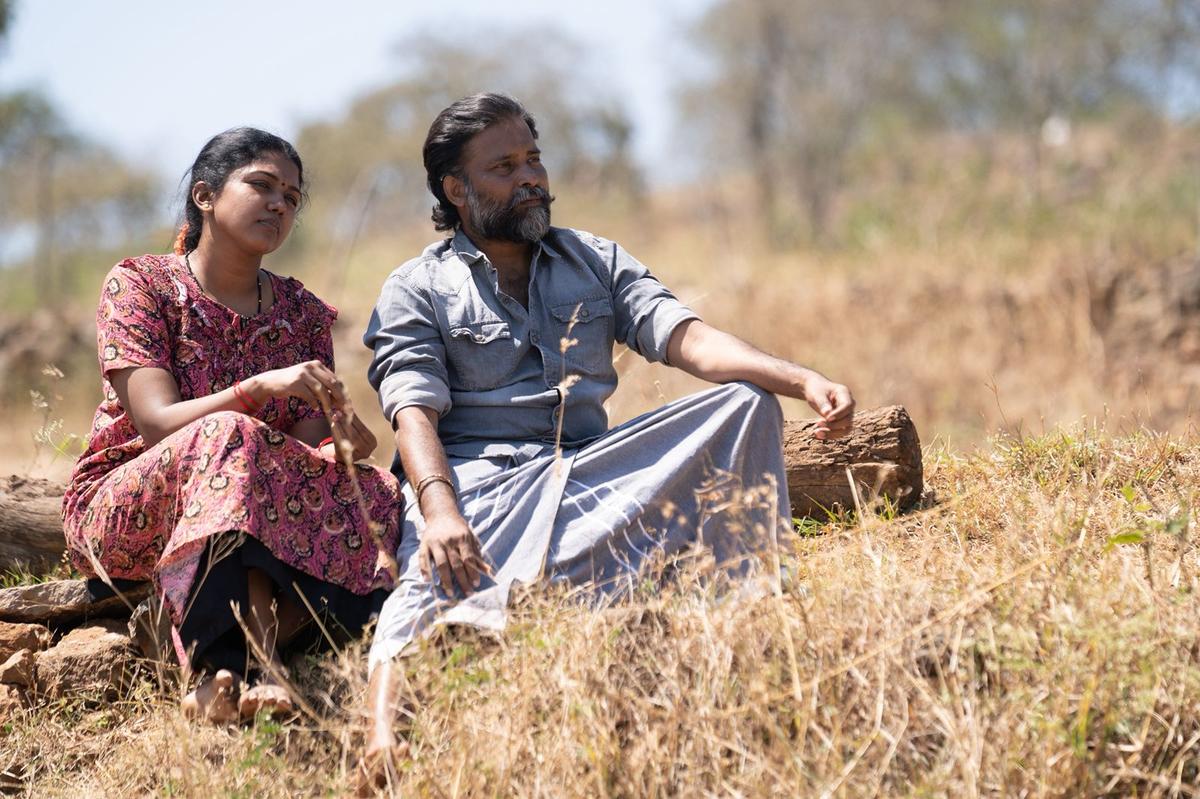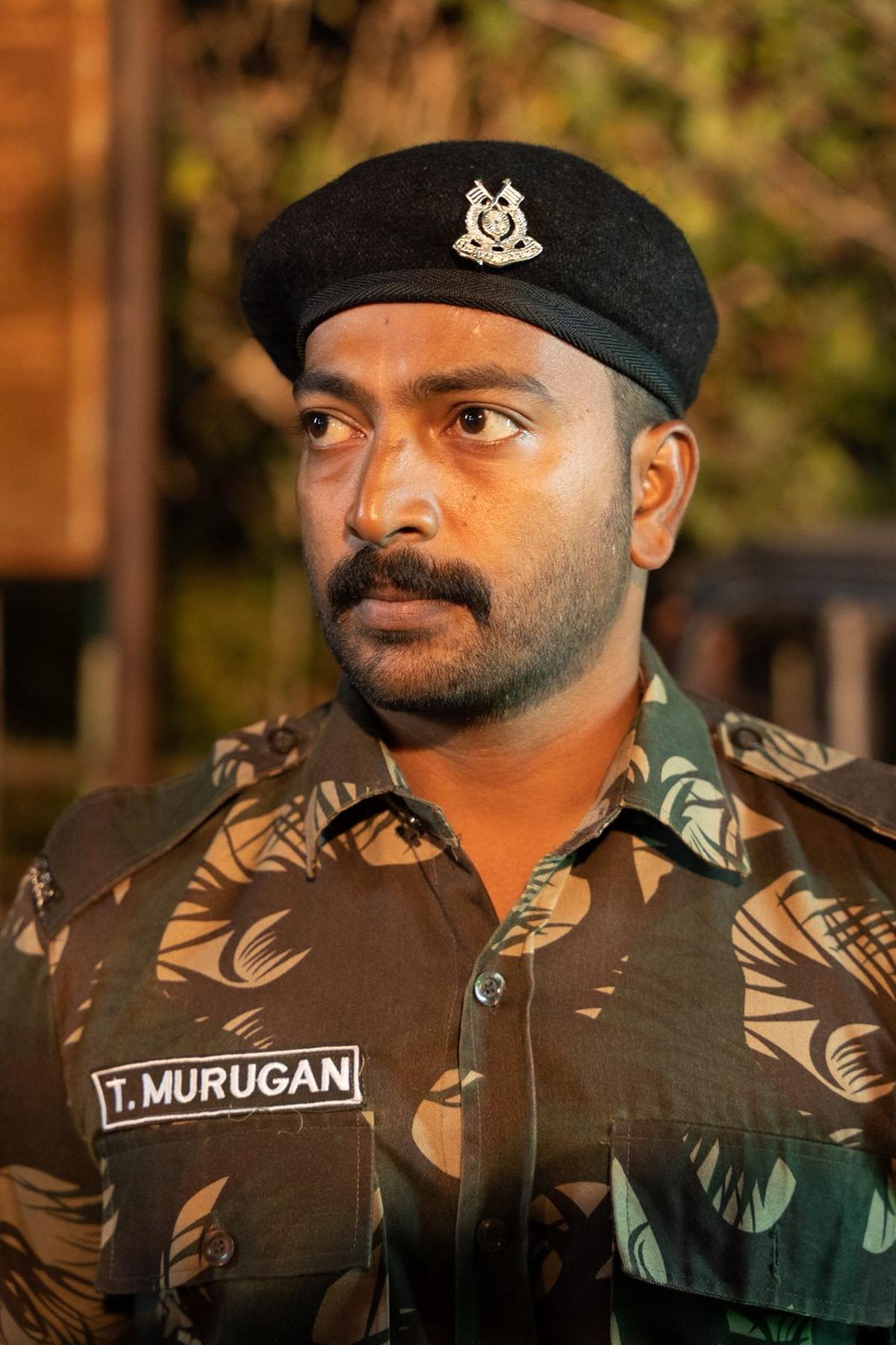Is man the most heinous animal of all? That’s the thought that arises as you watch Thandakaaranyam, director Athiyan Athirai’s emotionally heavy and extensively told social drama. In his sophomore film, theIrandam Ulagaporin Kadaisi Gundu director juxtaposes the dreams, naivety, and helplessness of his tender-hearted characters with the unjust and gruesome reality they are forced to suffer in, to make a complex point about systemic oppression. He does this by peeling more and more layers in his densely written screenplay. The film, produced by Pa Ranjith, examines a neta-sponsored trap used against Adivasi communities, the politics of love, the forest, language, Naxal identity, and the ugly face of greed.
Set in 2008, Thandakaaranyam is named after the Dandakaranya forest region, which spans across many central Indian states — it’s a region renowned for being a pivotal location in the Indian epic Ramayanam. Like Ram and Lakshmanan in that story, Thandakaaranyam too, at the heart of it, is a story about two brothers — one, Sadaiyan (VR Dinesh a.k.a. ‘Gethu’ Dinesh, plays it with the necessary stiffness), who believes in fighting fire with fire, in holding the so-called ‘men of law’ responsible for their own lawlessness, and two, his brother Murugan T (Kalaiyarasan, delivering a commendable performance), who carries the hope of all from his tribal village. Sadaiyan’s fiery eyes tell that he’s aware of what lies in his path, which is why he urges his brother to somehow become a permanent employee in law enforcement, to don the same uniform that is misused to prey on the vulnerable. But regardless of whether you stand against it or try to abide by its rules, the spiralling inferno of oppression threatens to swallow you whole, and Thandakaaranyam is a showcase of how this happens.

A still from ‘Thandakaaranyam’
| Photo Credit:
Special Arrangement
When we begin, Thandakaaranyam might remind you of Taanakkaran, as we are taken into a training camp on the outskirts of Ranchi, Jharkhand. This is where a paramilitary force called ISGS, organised to take on Naxalites across India, is being trained. We see how Murugan and his fellow Tamilian cadet, Rupesh (Bala Saravanan), are bullied by their northern counterparts, a gang headed by the envious Amitabh (Shabeer Kallarakkal is phenomenal as always). However, unlike conventional dramas that follow a specific conflict in one established setting, Thandakaaranyam plays the long game to make a point. Athiyan pulls the rug from under your feet as you realise that, like Murugan’s fellow batchmates, even you might have been quick to dismiss him as just another outsider struggling to fit in, which is why you might deem his reaction to a classic Ilaiyaraaja song as perhaps a tad overboard, until you fully realise the pain it brings to him.

We understand who Murugan is, why he holds his forest so close, the crushing reason behind his decision to join ISGS, and the long journey he has reached a midpoint in. A new terrain and its geopolitics are introduced: on one hand, Murugan’s brother Sadaiyan is locking horns with a corrupt local business magnate (Muthukumar), who is running a smuggling syndicate with the help of a corrupt forest officer — the same officer under whom Murugan is working as a temp, which obviously puts his future in jeopardy. On the other hand, Murugan’s social standing is repeatedly used to humiliate him, especially by the parents of his partner, Priya (Vinsu Sam is a revelation).
But that isn’t all. There are more concentric layers to this onion, and Athiyan Athirai peels further to reveal that everyone in this world is just a smaller fish, oblivious to being in the jaws of a killer whale — the larger system in which even the police is a cog in the wheel.

Thandakaaranyam (Tamil)
Director: Athiyan Athirai
Cast: Kalaiyarasan, Dinesh, Shabeer Kallarakkal, Bala Saravanan
Runtime: 130 mins
Storyline: To fulfill the dreams of his townsmen and to protect them from corruption, a tribal man goes through a long and gruelling journey at a paramilitary training camp
While watching Thandakaaranyam, you might get flashes of Taanakkaran, or Viduthalai, or even Visaranai. However, Athiyan’s film, which is based on a real incident that transpired in Jharkhand, suggests that while those above films managed to make you believe in their realities, it’s pivotal to emphasise how one vulnerable stratum of society can repeatedly be subjected to such oppression. The screenplay relentlessly takes us through Murugan’s story as he repeatedly faces hurdles in his quest; the idea is to make you wonder the mental and physical energy someone like Murugan requires in this unforgiving training camp, where cadets are treated like cattle.
This is the kind of film where even a minor misstep, or a move lacking clarity, could topple it all. Anything out of order can remove you from the immersion — which does happen a couple of times in some scenes featuring Murugan and Amitabh, and in figuring out why some non-Tamil characters speak Tamil in certain instances and in Hindi in others — but Athiyan’s screenplay more or less succeeds in ensuring you stay with the story. A different film with so much happening around the protagonist might come across as contrived, but Athiyan somehow manages to ground it all and make the progression of events seem seamless and believable.


A still from ‘Thandakaaranyam’
| Photo Credit:
Special Arrangement
Music and dialogue ably carry and deliver the emotions on paper. A piece of Oppari recurs throughout the film, and it tugs at your heart in the same way it does when played over darkness during the opening credits. Many effective dialogues come concealed with a rose, or sometimes, a razor. In a tender moment, a woman tells her partner of her desire to shed all their clothing in the thick of the forest and promenade on shallow waters until they reach the end of the forest. What happens at the end of the forest? Why not go further? The answer she says captures the lyrical depth of the text: beyond the forest lies their town, a place where they would have to put back all that they had shed behind — clothes, familial roles, social roles, gender, identity, and so on. In yet another instance, a shocking dialogue from a cop puts ISGS as a counter-terror effort to “deter the efforts of Naxalites, who are really all the tribal folks of the region who hinder domestic and international businessmen from exploiting natural resources through mining.” It’s a shocking statement that is made so casually, with the poetic irony being that the person who utters it.

Thandakaaranyam is anything but an easy story to tell. It’s a mountainous effort that sprawls and spreads into many things to earnestly talk about a solemn fact — the insurmountable weight of hate that rests heavily on the shoulders of some vulnerable sections of society. It is a lament that sends a tremor beneath our chest, and an existential symphony that tires you intentionally to make a point. It says a lot of things, but underlines one — man is, after all, nature’s most wicked of creations.
Thandakaaranyam releases in theatres this Friday
